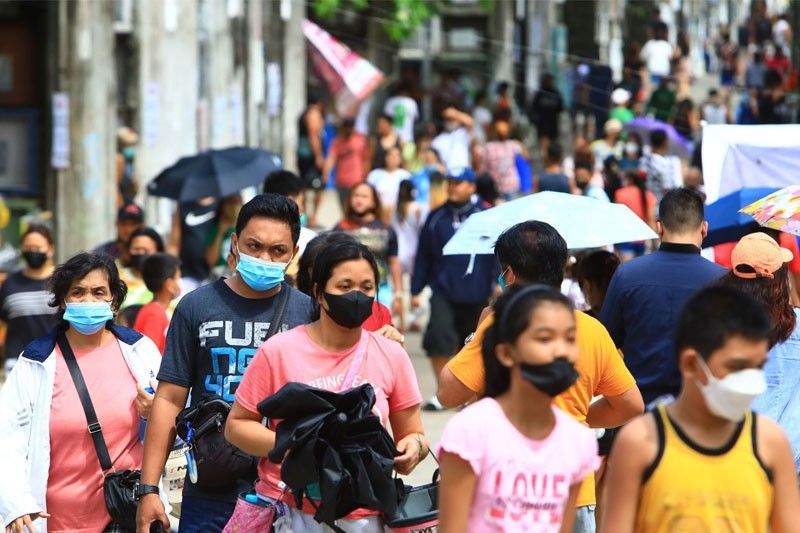COVID-19 positivity rate in NCR down to 10%

MANILA, Philippines — The percentage of people testing positive for COVID-19 in Metro Manila is down to 10 percent, the OCTA Research Group said yesterday.
The group, however, noted that COVID cases increased in four provinces.
In a tweet, OCTA Research fellow Guido David said the National Capital Region (NCR)’s COVID positivity rate decreased to 10 percent on Oct. 29, from 12.3 percent on Oct. 22.
“The (cases in) National Capital Region decreased from 12.3 percent to 10 percent. Increases observed in Benguet, Cebu, Isabela, Negros Occidental,” David tweeted.
OCTA said the positivity rates in Aklan, Bataan, Batangas, Bulacan, Cagayan, Camarines Sur, Cavite, Davao del Sur, La Union, Laguna, Pampanga, Pangasinan, Rizal, South Cotabato, Tarlac and Zambales also went down.
It noted an increase in Benguet from seven percent to 21.1 percent while Cebu registered a positivity rate of 10.3 percent from 8.5 percent.
Isabela recorded an upward trend of 33.9 percent from 20.7 percent while Negros Occidental had 15.4 percent from 10 percent.
David said positivity rates in Misamis Oriental and Iloilo also increased from 23.2 percent to 25.3 percent and from 15.2 percent to 15.4 percent, respectively.
Positivity rate in Tarlac remained highest at 36.8 percent, even as it went down from its previous 50.6 percent.
4 million COVID-19 cases
The Department of Health (DOH) reported on Sunday an additional 1,370 COVID-19 cases, bringing to 4,003,459 the total number of cases in the country.
Ahead of the coming holidays, the DOH had called on the public to assess the risks and strengthen the level of protection to limit the transmission of the virus.
DOH officer-in-charge Maria Rosario Vergeire said despite improvements in the country’s COVID situation, every Filipino must still cooperate with the government’s COVID-19 response.
Vergeire said every individual must assess the risks before opting to remove their face masks.
Based on recently approved classifications, the DOH reported that 89 or 74 percent of 121 provinces, highly urbanized cities and independent component cities and 192 or 29 percent of 669 other component cities and municipalities remain under Alert Level 1.
The DOH reported that 32 provinces, highly urbanized cities and independent component cities are under Alert Level 2.
“This means that our key indicators, such as the health care utilization rate, are showing improvements. We attribute this development to every Filipino who continues to cooperate with our COVID-19 response,” Vergeire said.
“But while we see a continuous decline in case and admission trends, we must remember that de-escalation does not mean that the battle with COVID-19 is already over. These current numbers are not permanent; we must all work together to maintain these low numbers,” she added.
She appealed to the local government units to intensify the implementation of vaccination and other strategies and policies against COVID.
Meanwhile, the DOH yesterday announced that 32 areas in the country will be under Alert Level 2 from Nov. 1 to 15 while 89 other areas are under Alert Level 1.
Among the areas under Alert Level 1 are the National Capital Region, Abra, Apayao, Baguio City, Mountain Province, Kailinga, Dagupan City, Ilocos Norte, Ilocos Sur, La Union and Pangasinan.
Also placed under Alert Level 1 are Batanes, Cagayan, City of Santiago, Isabela, Nueva Vizcaya, Quirino, Angeles City, Aurora, Bataan, Bulacan, Nueva Ecija, Olongapo City, Pampanga, Tarlac, Zambales Batangas, Cavite, Laguna, Lucena City, Rizal and Mimaropa.
Under Alert Level 2 are Benguet, Ifugao, Quezon province, Palawan, Camarines Norte, Masbate, Negros Occidental, Leyte, Northern Samar, Western Samar, City of Isabela, Zamboanga del Sur, Zamboanga Sibugay, Lanao del Norte, Davao de Oro, Davao del Norte, Davao del Sur, Davao Occidental and Soccsksargen. – Mayen Jaymalin
- Latest
- Trending


























